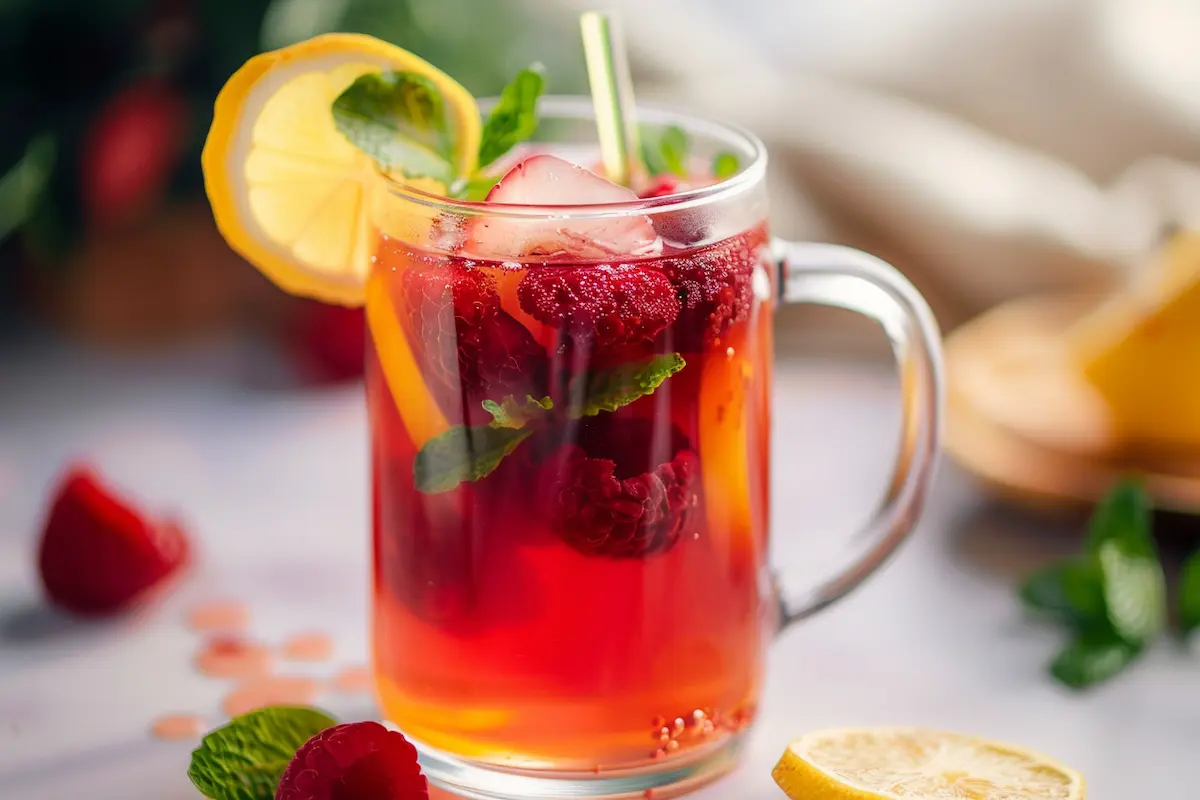Raspberry tea, a versatile herbal beverage, has been cherished for centuries, not just for its delightful taste but also for its impressive range of health benefits. Whether you prefer the medicinal properties of raspberry leaf tea or the sweet, fruity flavor of raspberry fruit tea, this drink offers something for everyone. In this comprehensive guide, we’ll delve into the types of raspberry tea, explore its numerous health benefits, learn how to brew it, and discover tasty variations you can try at home. Plus, we’ll highlight some excellent internal linking opportunities to related content for even more inspiration.
What is Raspberry Tea?
Raspberry tea is an infusion made from either the leaves or the berries of the raspberry plant. Both types offer unique benefits, making this tea an ideal choice for those looking to improve their health naturally. While raspberry leaf tea is particularly popular in the realm of women’s health, raspberry fruit tea is beloved for its sweet and tart flavor.
Raspberry Leaf Tea vs. Raspberry Fruit Tea
There are two main types of raspberry tea:
1. Raspberry Leaf Tea
Raspberry leaf tea is made from the dried leaves of the raspberry plant, which are rich in vitamins and minerals. It has been used for centuries in traditional herbal medicine, particularly for its benefits in supporting women’s reproductive health. This tea is often consumed by women to ease menstrual discomfort, regulate hormonal cycles, and prepare the uterus for childbirth.
The leaves contain high levels of vitamins A, C, E, and B-complex, along with minerals such as magnesium, potassium, phosphorus, and calcium. The tannins and flavonoids present in the leaves contribute to their anti-inflammatory and antioxidant properties, making raspberry leaf tea a great choice for overall well-being.
If you’re looking for a creative way to enjoy tea-infused treats, try pairing this herbal tea with our delicious Earl Grey Cookies Recipe. The rich and aromatic flavors of Earl Grey tea complement the subtle earthiness of raspberry leaves.
2. Raspberry Fruit Tea
Raspberry fruit tea is made from dried or fresh raspberries and is primarily consumed for its fruity and refreshing flavor. Unlike raspberry leaf tea, it is not commonly used for medicinal purposes but is enjoyed for its vibrant taste. The berries are packed with antioxidants and vitamin C, making this tea a great immune booster.
For a sweet twist on dessert, why not try incorporating raspberries into your baking? Our Ultimate Blackberry Cheesecake Recipe uses antioxidant-rich berries to create a dessert that’s both indulgent and good for you.
Health Benefits of Raspberry Tea
Herbal tea is not just delicious—it’s also loaded with nutrients that offer a wide range of health benefits. Below, we’ll explore some of the most notable advantages of adding Herbal tea to your daily routine.
1. Rich in Antioxidants
Herbal tea, especially raspberry fruit tea, is a potent source of antioxidants. These antioxidants, including vitamin C, help neutralize free radicals in the body, which can cause oxidative stress. This process is linked to aging, inflammation, and chronic diseases such as cancer, heart disease, and diabetes. By drinking Herbal tea regularly, you can help protect your cells from damage and maintain overall health.
For more antioxidant-packed dessert ideas, try our Blackberry Cheesecake Recipe, which uses another berry powerhouse rich in protective compounds.
2. Supports Women’s Reproductive Health
Herbal tea is especially popular among women due to its reputed benefits for reproductive health. The tea contains a compound known as fragrine, which is believed to help tone the muscles of the uterus. This can support the body during menstruation, pregnancy, and childbirth.
For women looking to ease menstrual cramps, Herbal tea is a natural remedy that helps to relax the muscles and reduce discomfort. Additionally, the tea is often consumed during the third trimester of pregnancy to prepare the uterus for labor, potentially shortening the length of labor and making contractions more efficient.
Some studies suggest that women who drink Herbal tea during pregnancy may have a reduced risk of needing medical interventions such as C-sections or forceps deliveries. However, it’s essential to consult with a healthcare provider before using Herbal tea during pregnancy.
For a delicious way to get more raspberries into your diet, check out our Raspberry Cake Recipes, which combine the sweet, tart flavor of raspberries with indulgent baked goods.
3. Boosts the Immune System
Herbal tea is rich in vitamin C, which plays a crucial role in supporting a healthy immune system. Drinking this tea regularly can help fend off infections, speed up recovery from colds, and protect the body from illness. Raspberry fruit tea, in particular, offers an easy and delicious way to boost your intake of this essential vitamin.
If you’re looking to support your immune system with delicious food, our Orange Olive Oil Cake is a nutrient-dense dessert that combines immune-boosting vitamin C with healthy fats from olive oil.
4. Supports Digestive Health
The tannins in raspberry leaves are known for their ability to soothe digestive discomfort. Herbal tea can help alleviate symptoms of diarrhea, nausea, and indigestion. The astringent properties of the leaves help reduce inflammation in the digestive tract, making this tea an excellent natural remedy for those suffering from mild digestive issues.
Herbal tea also has anti-inflammatory properties, which can help ease stomach discomfort and improve overall digestive health.
5. Helps with Weight Loss
Herbal tea, whether made from leaves or fruit, can be a valuable addition to a weight loss plan. The tea is naturally low in calories and can be enjoyed without the need for added sugars. Some studies suggest that the compounds found in raspberry leaves, such as polyphenols and catechins, can help boost metabolism and support fat burning.
While Herbal tea won’t single-handedly cause weight loss, it’s a great beverage to enjoy in conjunction with a healthy diet and exercise routine. To complement your weight loss journey, check out our Perfect Philadelphia Cheesecake Recipe, a lighter, lower-calorie take on a classic dessert.
6. Promotes Healthy Skin
Herbal tea, especially Herbal tea, is high in vitamins A, C, and E, all of which are known to support healthy, radiant skin. These vitamins help protect your skin from damage caused by free radicals, which can lead to premature aging. Drinking Herbal tea regularly can improve your skin’s texture, reduce the appearance of fine lines and wrinkles, and boost collagen production.
In addition to drinking Herbal tea, you can apply cooled Herbal tea topically to your skin as a natural toner. Its anti-inflammatory properties help tighten pores and soothe irritation, leaving your skin looking refreshed and rejuvenated.
For another skin-friendly dessert idea, try our Orange Olive Oil Cake Recipe, which combines the antioxidant power of vitamin C with the moisturizing benefits of olive oil.
7. Supports Cardiovascular Health
The antioxidants in Herbal tea can also benefit your heart. Antioxidants help reduce inflammation in the arteries, which can lower blood pressure and improve overall heart health. Regular consumption of Herbal tea may reduce the risk of heart disease by lowering cholesterol levels and improving circulation.
For a heart-healthy recipe that pairs perfectly with Herbal tea, try our Raspberry Cake to enjoy a delicious and wholesome treat.
How to Make Raspberry Tea
Making Herbal tea at home is easy and can be done using either raspberry leaves or fruit. Below are simple recipes for both raspberry leaf tea and raspberry fruit tea, along with a few tips for customizing your brew.
herbal tea with raspberry Recipe
Ingredients:
- 1 teaspoon dried raspberry leaves (or 1 tea bag)
- 1 cup boiling water
- Honey or lemon (optional)
Instructions:
- Boil a cup of water.
- Add the dried raspberry leaves to a teapot or mug.
- Pour the boiling water over the leaves and let steep for 5 to 10 minutes.
- Strain the leaves, add honey or lemon if desired, and enjoy.
Raspberry Fruit Tea Recipe
Ingredients:
- 1 cup fresh or dried raspberries
- 1 cup boiling water
- Honey or sugar (optional)
Instructions:
- Boil a cup of water.
- Add fresh or dried raspberries to a teapot or mug.
- Pour the boiling water over the raspberries and steep for 10 minutes.
- Strain the fruit, sweeten if desired, and enjoy!
For a creative twist on tea-infused baking, try our Ultimate Raspberry Cake, which blends the tartness of raspberries with sweet, moist cake.
Delicious Variations and Add-Ins for Raspberry leaf tea
While Herbal tea is flavorful on its own, you can elevate the taste by experimenting with different add-ins and variations. Here are a few ideas to get you started:
1. Lemon
Adding lemon to your Herbal tea provides an extra boost of vitamin C and adds a zesty, citrusy note. Lemon also enhances the tea’s antioxidant properties and makes it even more refreshing.
2. Mint
For a cooling, refreshing tea, try adding fresh mint leaves to your Herbal tea. Mint pairs beautifully with raspberry’s fruity flavor and offers additional digestive benefits. It’s perfect for an iced tea version of Herbal tea.
3. Ginger
Ginger brings a warm, spicy element to Herbal tea and adds anti-inflammatory properties. It’s particularly good for soothing nausea or indigestion, making it a great choice when you need a little stomach relief.
4. Honey or Maple Syrup
To naturally sweeten your Herbal tearaspberry tea, add a drizzle of honey or maple syrup. Both of these natural sweeteners enhance the tea’s flavor without adding refined sugar. Honey is also known for its soothing properties, making it a great addition if you’re battling a sore throat.
5. Green Tea
For an antioxidant boost, combine your raspberry tea with green tea. Green tea is rich in catechins, which are compounds that support heart health and metabolism. The combination of raspberry and green tea creates a delicious and health-boosting beverage.
Looking for more creative ways to incorporate tea into your diet? Try our Earl Grey Cookies Recipe or experiment with different tea pairings in desserts.
Raspberry tea for Pregnancy and Labor
Raspberry leaf tea is frequently recommended for pregnant women, especially in the later stages of pregnancy. It is believed to help strengthen the uterine muscles, making labor more efficient and potentially shorter.
Is Raspberry leaf tea Safe During Pregnancy?
Herbal tea is generally considered safe for pregnant women, but it’s always important to consult with a healthcare provider before incorporating it into your pregnancy routine. Most experts recommend starting to drink Herbal tea during the second trimester and increasing consumption as you approach your due date. Begin with one cup a day and gradually increase to 2–3 cups per day in the third trimester.
How herbal tea with raspberry May Help During Labor
The compound fragrine in raspberry leaves is thought to help tone the muscles of the uterus, making contractions more efficient. Some studies suggest that drinking raspberry leaf tea during the last weeks of pregnancy may shorten the duration of labor and reduce the need for medical interventions such as C-sections or forceps deliveries.
Conclusion
Herbal tea is a versatile and healthful beverage that offers numerous benefits, from supporting women’s reproductive health to boosting the immune system and improving digestion. Whether you enjoy the medicinal properties of Herbal tea or the fruity tartness of raspberry fruit tea, this tea is a perfect addition to your daily routine.
For more recipes and inspiration, check out our Raspberry Cake Recipes for a delicious way to incorporate raspberries into your desserts. You can also explore our Philadelphia Cheesecake Recipe and Ultimate Blackberry Cheesecake for more dessert ideas that pair perfectly with a cup of herbal tea with raspberry.

